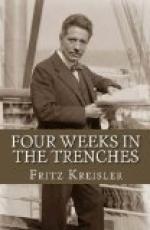Suddenly we came up with another regiment which had been called to the same task, and the colonel of the new regiment, being older in rank than our colonel, took command of the newly formed brigade of two regiments. My company happened to march at the head of the regiment and the new brigadier rode for some time alongside of me. I was deeply impressed by his firm military and yet unassuming bearing and his deep glowing enthusiasm for his army and his men. He told me with pride that two of his sons were serving in the army, too, one as an artillery officer and the other one as an officer with the sappers. We were then approaching the point where we could hear distinctly the fire of our own batteries and the answer from the Russians, and here and there a volley of rifle fire. Our colonel urged us on to renewed energy, and knowledge that we were nearing our goal, seemed to give new strength to our men. Already we were witnessing evidences of the first fight that had passed here, for wounded men constantly passed us on stretchers. Suddenly I saw the face of the colonel riding next to me, light up with excitement as a wounded man was borne past. He addressed a few words to the stretcher-bearers and then turned to me, saying: “The regiment of my son is fighting on the hill. It is one of their men they have brought by.” He urged us on again, and it seemed to me as if I noticed—or was it my imagination—a new note of appeal in his face. Suddenly another stretcher was brought past. The colonel at my side jumped from his horse, crying out, “My boy,” and a feeble voice answered, “Father.” We all stopped as if a command had been given, to look at the young officer who lay on the stretcher, his eyes all aglow with enthusiasm and joy, unmindful of his own wound as he cried out, “Father, how splendid that the relief should just come from you! Goon. We held out splendidly. All we need is ammunition and a little moral support. Go on, don’t stop for me, I am all right.” The old colonel stood like a statue of bronze. His face had become suddenly ashen gray. He looked at the doctor and tried to catch his expression. The doctor seemed grave. But the young man urged us on, saying, “Go on, go on, I’ll be all right to-morrow.” The whole incident had not lasted more than five minutes, barely longer than it takes to write it. The colonel mounted his horse, sternly commanding us to march forward, but the light had died out of his eyes.
Within the next ten minutes a hail of shrapnel was greeting us, but hardly any one of us was conscious of it, so terribly and deeply were we affected by the scene of tragedy that had just been enacted before us. I remember foolishly mumbling something to the silent man riding next to me, something about the power of recuperation of youth, about the comparative harmlessness of the pointed, steelmantled rifle bullets which on account of their terrific percussion make small clean wounds and rarely cause splintering of




